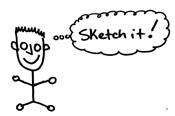

Sketchnoting for Academic Success
Dr. J. Ricky Cox
jcox@murraystate.edu
@Racerbiochem
WEBPAGE
 |
 |
| Also, check out my ChemiDoodles Page! | |
INTRODUCTION
Students in my IDC 199 (Fall 2013) course were introduced to the fundamentals of sketchnoting. Sketchnotes are rich visual notes created from a mix of handwriting, drawings, hand-drawn typography, shapes, and visual elements like arrows, boxes, and lines (definition from Mike Rohde, The Sketchnote Handbook). Although sketchoting was born out of the need to take better notes at conferences and in meetings, I believe the process of making sketchnotes may have tremendous educational value for students and professionals. This is especially true for students who struggle taking traditional notes or need a fresh approach to learning. Please keep in mind that this is about ideas, not art (The Sketchnote Handbook). Additional resources on sketchnoting are provided below. The sketchnotes made by leaders in this field are incredible!
SKETCHNOTING IN AN ACADEMIC SETTING
In this course, students were challenged to make sketchnotes in various areas to investigate their educational value. Please visit the links below to see examples. I would appreciate your thoughts on the educational value of sketchnoting (E-mail me at jcox@murraystate.edu). Overall, in my opinion, the educational value of sketchnoting can be summarized in these four words: Organize-Learn-Remember-Apply.
Thanks to all the students in this course for their hard work and willingness to share their sketchnotes. I would also like to thank Richmond Residential College for space and support.
SKETCHNOTES MADE IN IDC 199 (FALL 2013)
Sketchnoting to Expand Vocabulary: Want to expand your vocabulary? Of course, but do you remember the definition of a word minutes or days after looking up the definition? Can making sketchnotes about the word help you remember its definition and thus become a part of your vocabulary?
Sketchnoting to Learn Grammar Rules: We all love the rules of grammar learned years ago! However, we may need a refresher in some of the rules. Can sketchnoting help you remember the rules and use them properly when writing and speaking?
Sketchnoting a Video or Lecture: We watch TED and other videos to learn new things. Students take notes in courses to archive and capture information and thoughts. Videos are also used much more often these days as instructional tools. However, how much of the information covered in the videos or lectures do we actually remember the next day? Can sketchnoting help us organize, remember, and apply important information from videos or live presentations/lectures? Most of the excellent work in sketchnoting (see below) has been done in this area.
Sketchnoting to Rewrite or Recast Lecture/Meeting Notes: In an academic setting, we all attend meetings or classes in which notes need to be taken. Most students struggle with effective note-taking strategies and many professionals become bored in endless meetings. Can sketchnoting be an effective way to improving the note-taking process or rewrite/recast existing notes from class or a meeting? Will this technique help us organize and remember important aspects of a lecture or meeting?
Sketchnoting an Article: All students and professionals have to read articles about various subjects. Do we really read these articles with enough attention to detail? Do traditional notes on an article really help us remember important points of the article? Can sketchnoting be a way to promote closer reading of an article and produce notes that are useful to us and others at a later date?
Sketchnoting to Compare and Contrast: Comparing and contrasting is a common method of analysis. Can sketchnoting be an effective way to analyze topics in such a way as to remember key differences and similarities?
Some Sketchnoting/Visual Thinking Resources:
Mike Rohde Blog
*Sketchnote
Handbook
Sunni Brown
*The
Doodle Revolution (new book)
Chris Spalton (Why Sketchnote?)
Doug Neill (Educator's Guide to Sketchnoting)